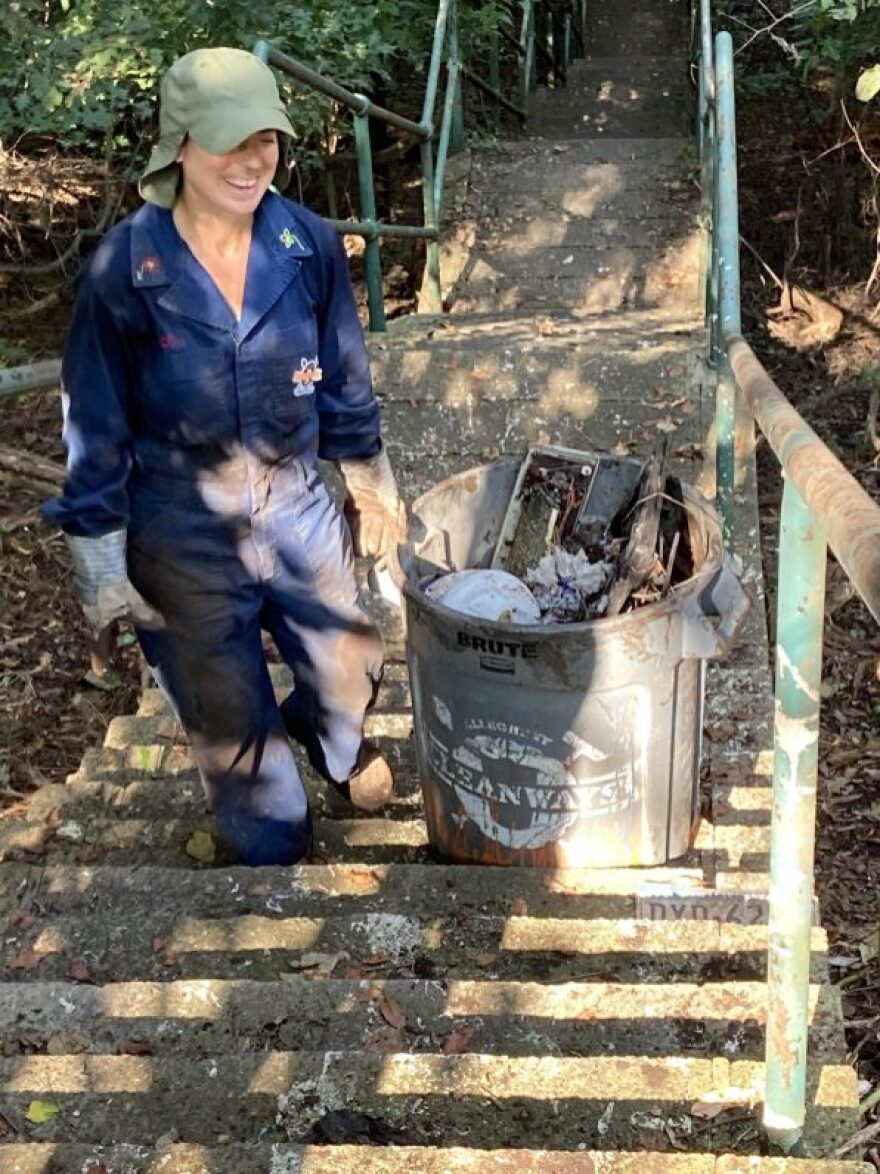Asia Tansmore loves her East Hills neighborhood in Pittsburgh because it’s quiet, but she doesn’t love the trash. Even amid the wildflowers and weeds, you can see the bottles, cans and wrappers in the empty lot across from her family’s home, and over the hillside a few doors down.
“Over here by the steps, the city steps, there is a lot of trash,” she said. “We deal with raccoons. We have very bad mice problems.”
People in this hilltop neighborhood use the concrete city steps, which are themselves in disrepair. But to the left and right, at the top of the steps, are mounds of trash, including tires and electronics. Tansmore’s even seen a washing machine.
The Singer Place steps is one of dozens of illegal dumpsites slated for cleanup by the nonprofit Allegheny CleanWays. A small crew from their DumpBusters program has already been to the steps three times, working up from the bottom.
Volunteers take to the steps
During a three-hour shift at the steps one Saturday morning in September, four volunteers and two staff members cleared just over 2,500 pounds of trash from around the top portion.
Wearing gloves and long sleeves to keep the mosquitoes at bay, Larissa Gula of Carnegie said her mother had passed on her passion for cleaning up litter.
“I used to give her a lot of grief for stopping to pick up trash, and now I do the same thing that she did,” Gula said, as she filled a trash can with broken CDs and styrofoam boxes. “So I guess we turn into our parents.”
Gula has been volunteering with Allegheny CleanWays for about three years.
“I think people act like litter shouldn’t be a thing,” she said. “But I also think that in reality, our system just is not designed to keep up with the amount of waste we produce.”
Dani Kramer, land-based program coordinator with Allegheny CleanWays, said volunteers are the reason they are able to clean up dumpsites four days a week, all year long.
“It gives me hope to know that other people are willing to do this in their free time,” she said. “It’s gross hard work, and just knowing that other people care — that’s a big reason why we do any of this: to signal to the people who have had to live near this trash that other people do care.”
How a hillside becomes a dumpsite

Kramer said dumping happens when something is difficult or expensive to get rid of the right way.
Shingles, building materials, and even concrete are common at dumpsites since contractors and demolition crews have to pay to get rid of construction materials.
Kramer said the household trash is a little more perplexing and upsetting.
“When you see a littered area, you’re more likely to add litter to it,” Kramer said. “I think that’s how this much household trash ends up here. One person misses garbage day and chucks it and it just kind of adds up. This stuff’s been building up for years.”
Hillary Steffes, who works part-time with DumpBusters, said sometimes household trash winds up here because of evictions and bad housing policy.
“Everything’s pretty political and tied to policy,” she said. “I don’t really get too offended by people’s personal behavior in regards to dumping sometimes because I know there are obstacles that are causing it.”
Steffes said when she sees toys, like a blue plastic baseball bat she found recently, or diapers and other baby supplies, it’s a signal to her that there might have been an eviction at play.
Solutions for the mess of illegal dumping
Kramer said to solve the dumping problem, more resources are needed so that people can dispose of waste properly. Trash cans that are regularly maintained are needed along city steps so that litter can be thrown away instead of ending up on the ground.
“One of the solutions, and it’s challenging to even conceive of, is having the producers of this stuff take responsibility for the products in the first place,” she said. “If tire companies had to account for each tire they made, and account for the full lifecycle of it, we wouldn’t have this huge problem with tire dumping.”
Tires are collected separately during their cleanups because they are disposed of differently than the trash collected and taken to Pittsburgh’s Department of Public Works. Tires are also more than just heavy and an eyesore. They collect water and breed mosquitoes.
Kramer said she wants everyone to feel indignant that neighborhoods like East Hills have to face tracts of land with illegal dumpsites. Their cleanups most often take place in neighborhoods where there are empty lots and disinvestment.
“Pittsburgh’s such a beautiful city, and every neighborhood has its own special hidden nooks and crannies,” she said, “Everyone deserves to have a clean and beautiful place to live.”
Read more from our partners, The Allegheny Front.
Please give now to continue providing fact-based journalism — a monthly gift of just $5 or $10 makes a big difference.




